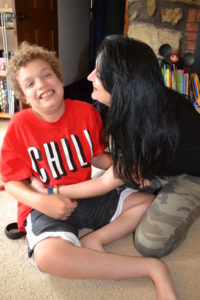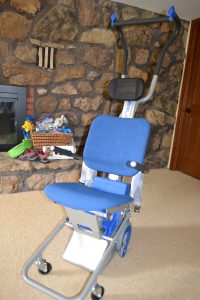
As every person’s abilities and needs differ, sometimes it is necessary for a person with a disability to require specialized equipment to live a more independent life. Support coordinators at Boone County Family Resources can assist persons served with securing such equipment by linking to therapists to assess individual needs and to research devices available.
For Dayton, 9, and his family, getting up and down the stairs in their home was burdensome. Dayton, who does not walk independently, is a growing boy and carrying him up and down the stairs was not safe anymore. Carrie, Dayton’s mother, said they looked into several solutions, including installing an elevator or a mechanical stair lift chair. “Both of those options were very expensive and wouldn’t work with the way our stairs are structured,” says Carrie. “We just couldn’t justify the expense, but we definitely wanted to find a solution.”
Carrie and her husband, Alón, share a unique split-level custom home with Carrie’s parents. Carrie’s family occupies the lower level while her parents live in the upper level. A few years ago the home was completely renovated to make it more accessible for Dayton – including a zero-entry shower and wider hallways to accommodate a wheelchair. However, nightly family dinner together in the upstairs eat-in kitchen was a tradition they wanted to uphold, but safely getting Dayton up the three-part stair case was getting harder and harder to manage.
Dayton’s Support Coordinator, Suzanne Boss, worked with the family to find a solution. She connected them with TigerOT, program offered through the University of Missouri School of Health Professions Occupational Therapy Department. TigerOT offers free home safety assessments and recommendations so people with disabilities and their caregivers can enjoy a greater quality of life in their home.

Giuli Krug, PhD, OTR/L and Director of TigerOT, came to Dayton’s home accompanied by some MU Occupational Therapy students. They observed Dayton interacting with his home environment and made a couple of recommendations, one of which was to learn more about a device called the Liftkar Stair Climber – a mobility dolly that enables a caregiver to safely transport an individual up and down stairs. “Giuli invited us to attend a demonstration of the device at MU,” recalls Carrie. “We met Brad Kohlbrechler from 101 Mobility in St. Louis who showed us how the Liftkar works. We were excited that we might have found something that would work for our family.”
After the demonstration, Carrie worked with Brad to get exact measurements of their stair case to see if the product would indeed work for their home’s stair case. “On one of the turns of the stairs, the step is just barely deep enough for the Liftkar, but Brad was confident that it was going to work for us,” said Carrie. “Then we started the process to get the Liftkar funded.” Suzanne worked with the family to get Dayton on the Partnership for Hope Waiver which ultimately provided the funding for the Liftkar. “I highly recommend this device for anyone with a similar need,” says Carrie. “Not only is it very easy to use, but also it can come apart for travel, should we ever need that option.”
Carrie said that Brad from 101 Mobility was wonderful to work with. “Brad came to our home to fully train all of us on how to use the Liftkar. He wouldn’t leave until every single one of us felt comfortable using it. And if I can use it, anyone can use it!”
“I don’t know what we could have done otherwise,” says Carrie. “The Liftkar is awesome. We don’t have to worry about hurting Dayton or ourselves during transport, and we don’t have to be isolated to one level of the house. And, Dayton thinks it’s pretty cool, too.”
Some other examples of specialized equipment the agency can assist with include Braille, video or audio-recorded directions, augmented communication technology, talking alarm clocks, hearing aids, therapy balls, wheelchair cushions to prevent skin breakdown, adapted car seats, shower chairs and items to assist with toileting.